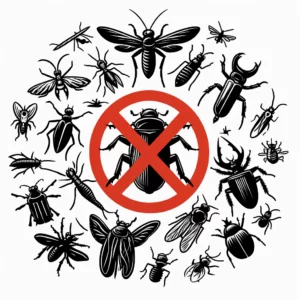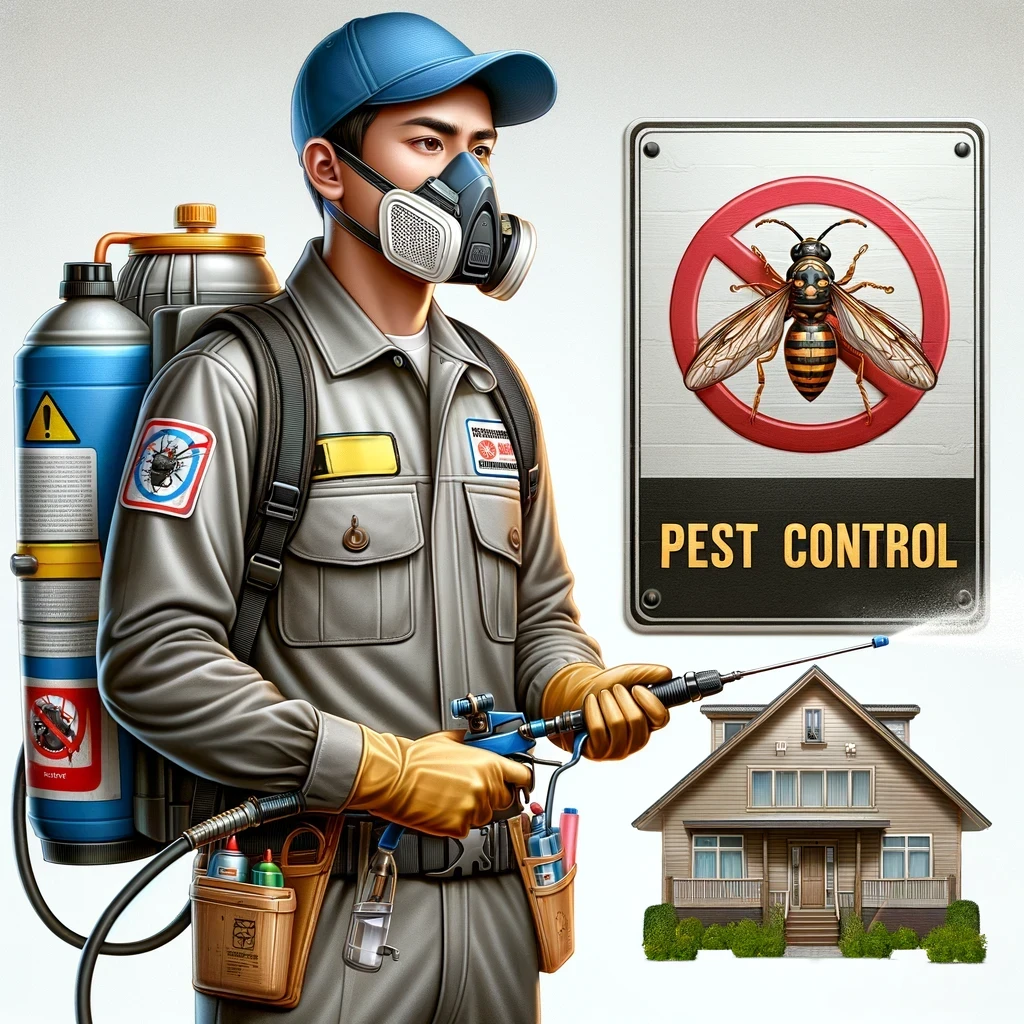The Quiet Killer: Why Pest Control Is Not Just a Nuisance – Use Licensed Pest Control Operators
Picture this: you get back after a busy day to find little ants parading over your kitchen hatap¬ment Or better still, when you are having a lovely relaxed evening and the irritating fizz of a byronic mosquito keeps pestering you far from actually unwinding. While these are obviously fairly innocent occasional occurrences during day to day living, over the course of just a short time may they can turn into serious problems.
Pests are more than just pests; they can cause health, safety, and property problems. And let’s face it — there’s a whole range of repercussions that can come from neglecting the existence of pests, such as allergies and diseases to structural damage or worse even fire hazards.
For detailed information about pest control in the home, don’t miss our The Ultimate Guide to Pest Control in the Home: Protect Your Sanctuary from Unwanted Invaders

Understanding the Dangers of Pest Infestations
These critters bring all kinds of diseases with them, some are very serious and even deadly for the those at risk such as small kids, not in their prime or having a compromised immune system. Consider the possible hazards of:
- Rodents: These nasty critters are excellent carriers of several hazardous disease, such as:ñasalmonellosisånleptospirosisyanhantavirus
- Cockroaches cause allergies and asthma, as well as food poisoning bacteria.
- Mosquitoes: These critters are responsible for some of the serious diseases such as West Nile Virus and Zika Virus or Malaria.
Apart from health dangers, bugs can likewise harm the structural integrity of your home. For example, termites are notorious for eating through wood, undermining housing supports and may be costly to repair. Mice can chew on wires, making them a fire hazard.
The Professional Pest Control You Need
There are several do-it-yourself solutions that may work for minor pest problems, however, most infestations require the skill of a professional pest control operator. These are professionals – more than mere exterminators, they have the training to confidently identify pest species, behavior and optimum control strategies.
Not only do licensed pest control operators have the know-how to:
- Pest Recognition: Precise identification of the pest type is vital for choosing the proper treatment.
- Warning the severity of the infestation: Professionals can also assess how bad your termite problem is and provide you with some advice.
- Use safe and effective methods: Licensed operators employ a range of methods, including environmentally friendly options, to ensure that pest control is conducted safely and effectively.
- Avoid future infestations: Pest control technicians usually include preventative actions to reduce the likelihood of more pest problems.
Hiring a pest control expert for the job is a step in the right direction, ensuring that your space and investment as well as health is safe.
Further Than the Hum, Prescott Pest Control Permit Legalities
Seeing a bug scurry across your floor may spur you to grab the first can of pest spray and take care/directly away that mother! But you can’t just go rogue and do DIY pest control, there is a legal framework in which these businesses must operate.
Why State-Specific Licensing Requirements Are So Important
Having a pest control license is not the same everywhere. States/territories may have distinct pesticide statutes and pest management practices. The Former Controller of Pesticidesethics really is a Welsh Fund and topic The Managing PestsAn Agent can issue directionsAs vital, an agency may possibly immediateThese principles are set up for public safety, environmental security also to promote and sustain a standard of practice in pest control.
Licensing and Training/Competency
One of the main reasons licenses are mandated is to ensure that all pest control technicians have received adequate training and are equipped with the proper knowledge needed to treat many problems in a safe, legal way. What a licensed operator has shown the knowledge of:
Identify the Pest: it is important to know what and who you are dealing with when learning how to get rid of garden pests.
- Pesticide Use: licensing of pesticide users ensures the safe handling, storage and application of pesticides to reduce risks to human health, pets and the environment.
- Preservation of Ecosystems and Waterways: Licensed operators are regulated by strict environmental regulations pertaining to the use and disposal of pesticides.
- Safety Protocols: Licencing strongly advises patients to strictly follow safety protocols during treatment leaving no risks on human health.
Use Licensed Pest Control Operators: Look For Verification
Checking Out the License: One of the most vital thing which you must carry out before hiring any pest control operator is to confirm that they have a license. Here’s how you can check:
- Online information: Many states offer online databases where you can search for licensed operators in your territory. Search for the environmental health department or pest control agency land on your state office.
- License: Get the operator’s license number and check it via the web database.
- Contact Information: If you cannot locate this information online, contact the pest control or environmental health agency in your state.
- Show proof of a Physical License: Any reputable operator should be willing to show you their license if prompted for one.
If you only checked a pest control operator license, it is tantamount in insuring that the business will provide you with all its legal and ethical liabilities. This protects both your health, the environment and any real estate property you have.
The Benefits of Professional Pest Control Expertise
If this sounds a bit much for you and you find yourself running to grab the bug spray, remember that is just your first step toward pest control.
Though the thought of pests in your home may cause you to grab a can of bug spray as instinctively as reaching for the phone when it rings, pest control is not simply about “spray and pray”. This expertise is what sets a licensed pest control operator apart from the rest, offering more than just extermination but rather safe and effective solutions for your pest problems.
Pesticide Safety: What We Know and What We Don’t
Although pesticides are strong chemical substances used to eliminate or control pests. Although they can be effective, but if it is not handled in a proper way, then have some risks inside of them. Pest workers know some of the risks when eventually working with pesticides.
- Pesticide Toxicity: taught what different types of pesticide are, their levels of toxicity and their consequences on human health, pets and the environment.
- Safe Handling and Application: Pesticides are handled, stored and applied according to the strict health guidelines of pest control professionals in order to protect individuals from harmful exposure or unintentional poisoning.
- Environmental: Operators follow regulations on how to apply pesticides which protects the water resources and environment.
For Your Eyes Only: Proper Pest Identification and Treatment
There is no easy answer to whether or not a pest control product will work. What works best will depend on the type of pest you have. When it comes to identifying pest species, and creating treatments that are specific to those pests licensed pest control operators have the knowledge and experience necessary.
- Pest Behavior and Habits: Professionals are knowledgeable about the manner in which pests behave, making it easier for them to locate where infestation is coming from and hence control accordingly.
- Selecting Appropriate Treatments: Operators use the information about what they have identified to select the most effective treatment techniques, whether it is baiting or trapping or youth of specific pesticides.
- Preventing Resistance: Licensed operators are cognizant of the ability of pests to develop resistance to certain pesticides and they use tactics that prevent resistance.
Piece of Mind, Keeping Your Home and Family Safe
So, when you get a pest management adviser to do it for you this is done not only to eradicate the pest but also giving that peace of mind. Our professionals are committed to formulate most secure, advantageous and ecologically responsible solutions for your pest problems. Thus, you can rest assured in the fact of your home and your family being safe even when the pest infestations go uncontrolled.
Professional Pest Control, Not Just Extermination
Although the whole point of pest control is to eliminate pests from your home, the best way to do that is not necessarily by just shooing them away. Trained pest control operators provide a comprehensive remedy to rid you of the root causes of an infestation and also lay plans for preventing future complications.
Treating Your Issues Effectively: Customized Programs for Your Pests
When you work with licensed pest control operators, they do not waste your time chasing after solutions that are one-size-fits-all. They instead develop custom treatment plans based on the kind of problem invading your space.
- Full Site Inspection: An extensive evaluation of your property to find any evident entrance points for pests, the nesting sites as well as other factors that may be contributing to such an unprecedented infestation.
- Targeted Treatments: To do this, specialist tissue plans are needed to provide treatments tailored for the targeted pest species and it’s behavior using what is called more “green” technologies.
- Integrated Pest Management (IPM): Certified operators will frequently use various other approaches such as IPM that incorporate prevention methods, non-chemical options and also to spot treat chemical applications in order to create a customized program.
How to Get Rid of Wood Mites In House — Prevent Future Infestations
The best pest control measures work to prevent infestations before they even occur. Licensed operators are trained to spot areas where pests may be able to enter and take measures to prevent them from becoming a problem in the future.
- Sealing Entry Points While inspecting, professionals will locate and seal cracks, gaps, and other openings that pests might use to get inside.
- Food Storage & Controlled Environment: Licensed processors offer advice on proper food storage, such as maintaining a clean work surface and not leaving leftover crumbs that lure in pests.
- Yard Maintenance: Professionals will tell you ways to maintain your yard, trim your vegetation on the long side shrubbery, get rid of nesting places and handle cleanliness in properties.
That peace of mind: how to get that?
Ultimately, spending money on a professional pest control service is an investment in the long-term well-being and value of your home. Proactive Pest Management: Ultimately, by taking a proactive approach to pest management you are protecting your property from the damage and cleanliness risks associated with infestations. This means:
- Prevent damage to your home: Stringent pests control can help you save money that would otherwise be spent on repairs in case these critters damaged your house structure and appliances together with furnishings.
- Improved Health and Safety: Living within a pest free environment helps to protect the health of your family as it reduces the chances to suffer from allergies, diseases and possible risks.
- Added Property Value: A home that is well-kept and free of pests will be more enticing to potential buyers, elevating its overall value.
Though, it is reasonable to trust in professional pest scontrol at every possible prevention of pests problem and need the peaace that comes with knowing your property is safe.
Selecting The best Pest Control Operator For Your Needs
With that in mind, and now that you know how a licensed pest control operator can help protect your home… How do you find the right one for you? Much like you would not trust any mechanic to work on your car, you should screen the pest control operator that have knowledge and experience in controlling your situation efficiently.
Education & Best practices: How to make the plunge
Information Gathering and exploration. Do not be afraid to ask around from friends, neighbours or relatives who have had good encounters with pest control companies.
- Reviews of the Company on the Internet: Those that can provide a basic review Online reviews websites such as Yelp, Google Reviews or Angie’s List offer an overview of how customers perceive different pest control companies. Take your time reading reviews from their previous clients and how responsive, professional they are and effective.
- Local Resources: You can contact the Better Business Bureau (BBB) to see if there are complaints lodged against a company. The BBB can also furnish you with a list of approved pest control organizations in your zone.
Asking the Right Questions: Ensuring a Comprehensive Understanding
After identifying a few potential operators, it is important to ask some critical questions in order to make an educated choice.
- Expertise: Ask them their experience with the exact pest your are dealing with. As an example, if you are having a termite issue, you need to pick a business that has encounter in doing quality termite control.
- Licenses and certifications: Be sure to ask about licensing as well as any extra certifications they have in the field This shows they take their job seriously and are actively improving.
- Treatment Approaches: Ask in detail about the various methods that they use to control pests and if they provide eco-friendly treatment options Bring up any concerns you may have on particular pesticides or treatments.
- Products and Solutions: Learn about what the company offers, their price packages and service bundles. Inquire With Vendors — ask what types of warranties or guarantees they might offer.
- Communication and Transparency: Everyone communicates differently — you may be the nurturing, patience-seeking type while someone else just wants to know all about everything going on inside their mouth for peace of mind. Consider how you like to receive information from your dentist when deciding if there’s a strong match in this department with your chosen practice. Do they speak clearly?
Matching — Trust and Confidence Building
Choosing a pest control operator is something that needs to be carefully deliberated because you have to decide for the one who deserve your trust.
- Professionalism and Respect: Find an operator who behaves professionally in front of you and on your premises.
- Communication and Responsiveness: we advise you to select only those companies who have respectful response customer service, quick feedback for your queries and explain their procedure in a precise way.
With a little bit of research, some questions and evaluation you can discover the right partner for making sure your home remains pest free when keeping your house safe in addition to enjoyable.
Frequently Asked Questions About Licensed Pest Control Operators
Why is it important to use a licensed pest control operator?
Licensed pest control operators are required to undergo rigorous training and meet specific standards to ensure they are competent and qualified to handle pest problems safely and effectively. This includes understanding pesticide regulations, safe handling practices, and environmentally responsible pest control methods. Using a licensed operator protects your family’s health, the environment, and your property from potential harm.
How do I verify a pest control operator’s license?
Most states have online databases where you can search for licensed pest control operators. You can usually find this information on the website of your state’s environmental health department or pest control agency. You can also ask the operator for their license number and verify it through the online database. If you’re unsure, contact your state’s pest control agency or environmental health department for assistance.
What should I ask a pest control operator before hiring them?
When choosing a pest control operator, ask about their experience in dealing with your specific pest, their licensing and certifications, their treatment methods, their pricing structure, and their communication style. Ensure they provide clear explanations of their procedures and address any concerns you have about pesticides or treatment methods.



